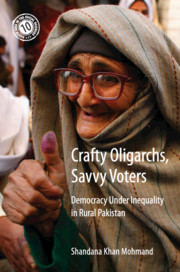Book contents
- Frontmatter
- Dedication
- Contents
- List of Tables and Figures
- Acknowledgements
- Glossary of Local Terms
- 1 Introduction: Rural Voters under Inequality in an Emerging Democracy
- 2 Colonial Constructs and Post-colonial Politics: 1849–2018
- 3 Landed Power in Sahiwal: From Domination to Intermediation
- 4 Local Competition and Bargaining Power: Conceptualising Political Engagement in Rural Punjab
- 5 Bargaining with Landlords: Comparing Political Engagement in Unequal Contexts
- 6 Structural Inequality and Variations in Political Engagement
- 7 When Do Shifts in Political Engagement Occur?
- 8 Conclusion: The Future of Pakistan's Democracy
- Annex 1 Chronology of Political Events in Pakistan
- Annex 2 Index of Political Engagement (IPE) Scores for 38 Villages
- Annex 3 Research Instruments
- Annex 4 Detailed Descriptions of Household Variables Used in Multivariate Regression Analysis
- Bibliography
- Index
3 - Landed Power in Sahiwal: From Domination to Intermediation
Published online by Cambridge University Press: 26 April 2019
- Frontmatter
- Dedication
- Contents
- List of Tables and Figures
- Acknowledgements
- Glossary of Local Terms
- 1 Introduction: Rural Voters under Inequality in an Emerging Democracy
- 2 Colonial Constructs and Post-colonial Politics: 1849–2018
- 3 Landed Power in Sahiwal: From Domination to Intermediation
- 4 Local Competition and Bargaining Power: Conceptualising Political Engagement in Rural Punjab
- 5 Bargaining with Landlords: Comparing Political Engagement in Unequal Contexts
- 6 Structural Inequality and Variations in Political Engagement
- 7 When Do Shifts in Political Engagement Occur?
- 8 Conclusion: The Future of Pakistan's Democracy
- Annex 1 Chronology of Political Events in Pakistan
- Annex 2 Index of Political Engagement (IPE) Scores for 38 Villages
- Annex 3 Research Instruments
- Annex 4 Detailed Descriptions of Household Variables Used in Multivariate Regression Analysis
- Bibliography
- Index
Summary
At the centre of many explanations for Pakistan's unstable democracy remains the landlord, still seemingly in control of his/her constituency, able to deliver the votes to any party that asks and, by extension, in apparent control of the population that makes up the constituency – parties and kinship notwithstanding. How does one reconcile this view with the transformations that have occurred in rural economy, society and politics over the last few decades? Are Punjabi landlords in as much control of their rural constituencies as is suggested? If yes, how have they managed to retain this control, and if not, why then are they still at the centre of Pakistan's political story? I answer these questions in this chapter by returning to Sahiwal village in Sargodha district and tracing its history from the 1960s to the election of 2008. Sahiwal presents a perfect case study in which to investigate these questions because it is home to a landlord family that fits the stereotypical image of the ‘feudal’ lord with historical landed power that s/he uses to exploit the dependence of landless villagers for political gain – the crafty oligarch of popular discourse in Pakistan.
It is also a good place to gain a unique insight into institutional path dependence – how initial conditions of inequality produce a certain type of local politics, despite socio-economic and political changes over time.
Sahiwal was studied in detail by Saghir Ahmad in 1964–65 as the case study for his doctoral dissertation (Ahmad 1977), and then again in 1978–80 by Shahnaz Rouse for the same purpose (Rouse 1988). It is, therefore, the perfect site for a longitudinal study that can provide a unique, micro-level view of the impact of structural changes – such as land reforms and agrarian modernisation – and of national political changes represented by alternating periods of authoritarianism and democratisation on the residents of a village, and on their political and socio-economic relationships with one another.
Armed with the earlier studies, I came to this village with a team of researchers in 2006–07. We knew from Ahmad's and Rouse's studies that Sahiwal had been steadily changing over the decades, but much of what we saw here, such as the village meeting recounted in the initial pages of this book, seemed to support the usual stories about the unfree votes of rural Punjab.
- Type
- Chapter
- Information
- Crafty Oligarchs, Savvy VotersDemocracy under Inequality in Rural Pakistan, pp. 85 - 119Publisher: Cambridge University PressPrint publication year: 2019

